Bakhita House 1 CROP.jpg
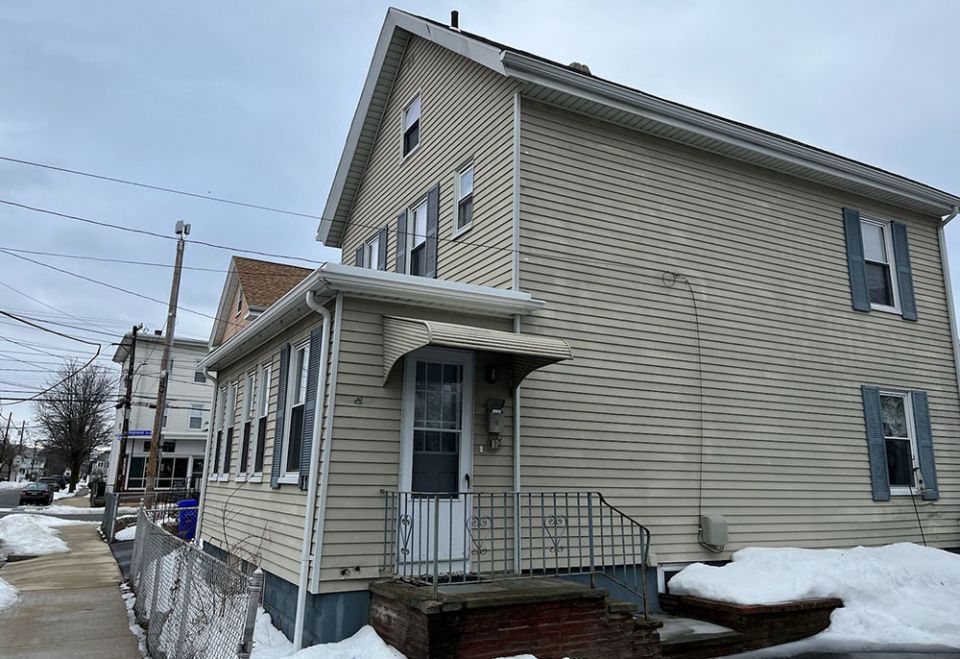
Editor's note: St. Josephine Bakhita, for whom Bakhita House in the Boston area was named, was brutally enslaved as a child in Sudan in the late 1800s. She was taken to Italy and, after being declared free, became a Canossian sister. Canonized in 2000, her feast day is Feb. 8 and is observed around the world as an International Day of Prayer and Awareness for victims of modern-day slavery and trafficking. Read all of Global Sisters Report's stories on sisters' anti-trafficking advocacy.
Boston — When the weather is nice, Crystal Teixeira, 41, rides her bike around her neighborhood in Dorchester, Massachusetts. She said she likes to feel the fresh air in her lungs and the sunshine on her back. Some days, the memories still swarm around her, like ghosts, but she no longer lets them weigh her down. Soon, she hopes to get back into the workforce, but right now, she is working on herself. Her freedom is her essential power. Her time belongs to her and those she loves.
For much of Teixeira's life, love meant captivity. At 23, Teixeira opened her heart to a man who took her body, her mind and her dignity instead. Promising to protect her, he coerced her into selling sex to other men in the Miami area. Then, he took every dime she made, insisting he would take care of her financially. As he dragged her to clubs and bars throughout Miami, however, pressuring her into performing sexual favors and intercourse behind the doors of high-end hotel rooms, Teixeira's confidence withered away.
It wasn't until she found herself at the doorstep of a safe house run by a group of Catholic sisters that she would start to get it back.
Teixeira is one of 59 human trafficking survivors who lived in the Bakhita House, a safe house for sex and labor trafficking victims that was first located in Quincy, Massachusetts, and later, in Malden. Founded in October 2011 by the Boston Unit of the Leadership Conference of Women Religious, who received prayers and financial support from 21 congregations, the Bakhita House was one of the first safe houses created specifically for human trafficking survivors in New England.
6 Bakhita House sisters CROP.jpg
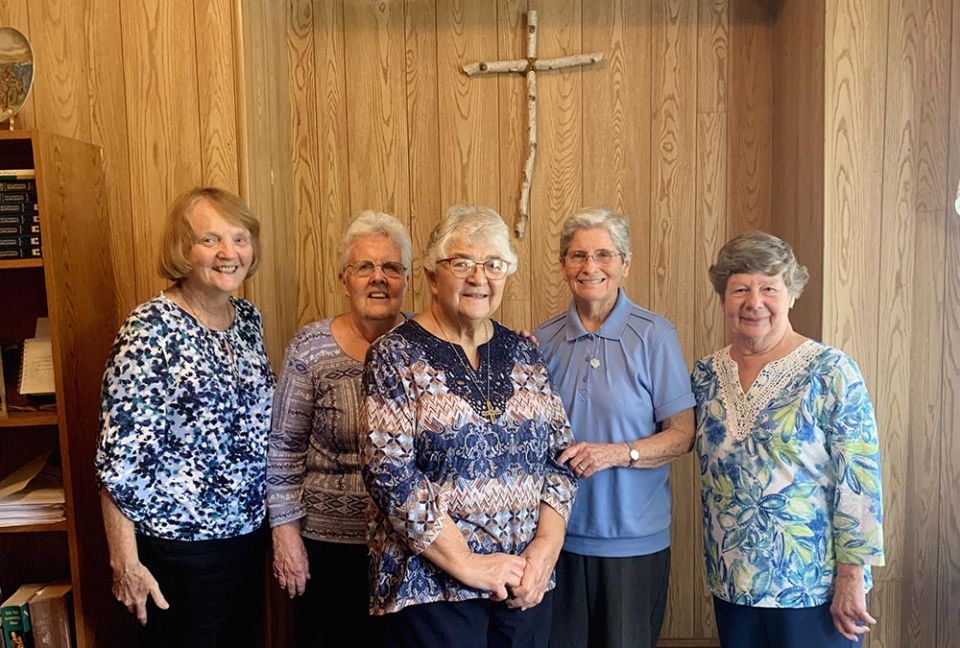
Among those who worked and lived in the house were Srs. Peggy Cummings, Mary Jane Cavallo and Maureen Marr from the Sisters of Notre Dame de Namur; Srs. Carol Verville and Sally McLaughlin from the Sisters of Charity; and Sr. Kay Lawlor from the Medical Missionaries of Mary. Cummings said there were also countless volunteers and laypeople who helped keep the house running.
Working closely with the FBI, Homeland Security and Boston law enforcement, the sisters who lived in the house full time were committed to providing a home to as many victims as possible, despite there being only three bedrooms inside.
Nikki Antonucci, chief of Victim Witness Services for the Massachusetts Attorney General's Office, said that the sisters' calm demeanor made them reliable resources and colleagues.
"They were just phenomenal to work with," said Antonucci. "They always answered our calls, whether it was a Saturday or a Sunday or 10 o'clock at night."
The birth of the Bakhita House traces back to a group of sisters who named themselves the Anti-Trafficking Coalition in 2007, setting out to research human trafficking and spread awareness through prayer vigils and educational symposiums. In doing so, these sisters were shocked to find that there were almost no safe houses for human trafficking victims in New England. To address this need, a smaller group of sisters from the coalition teamed up with members of LCWR to explore the possibility of opening a local safe house.
As their knowledge on the subject deepened, so too did their clarity; Cummings said she felt that God was asking them to take a leap.
'I got my confidence back. I mean, for someone to say that they love you and to genuinely know that they mean it — that means something.'
—Crystal Teixeira
"I thought to myself, 'Why can't we do this?' " said Cummings. "We can do this. It was just seeped in my head."
The Bakhita House was the answer to the sisters' collective prayer. Designed to be more than just a shelter, it became a home — a place to start over, a makeshift family solidified by the firm belief that every person is worthy of knowing unconditional love.
"I got my confidence back," said Teixeira. "I mean, for someone to say that they love you and to genuinely know that they mean it — that means something."
There were 3,224 reports of human trafficking in the commonwealth of Massachusetts between 2007 and 2020, with 819 of these becoming cases, according to the Massachusetts National Human Trafficking Hotline.
Given this dire need, various organizations, schools, parishes and individuals in the Greater Boston area were eager to donate money and essential items to the Bakhita House.
Advertisement
Advertisement
Although shelters and victim advocacy organizations have since expanded across Massachusetts, a collaborative program between Catholic nuns, local law enforcement and human trafficking victims has yet to be replicated in the state since Bakhita House was forced to close in 2018 when the sisters were no longer able to work in the house full time, due to age and other obligations.
Nonetheless, Cummings said, the sisters continued to provide financial and emotional support to the women for years after the house closed and are still in touch with many of them today. The profound legacy of the home can be felt in these ongoing relationships and in the stories of the women who passed through.
Cavallo said that most of the victims who arrived at the safe house had hit rock bottom. They were broken in spirit — lost, hopeless and afraid. Some had been beaten. Some had been raped. Some had been told they would never be loved.
The women who walked out of the safe house, however — a month or perhaps a year later — often held their heads higher. Many of them had acquired jobs and degrees and new dreams for the future. With this came a newfound confidence and permission to trust that there was good in the world.
9 nook CROP.jpg
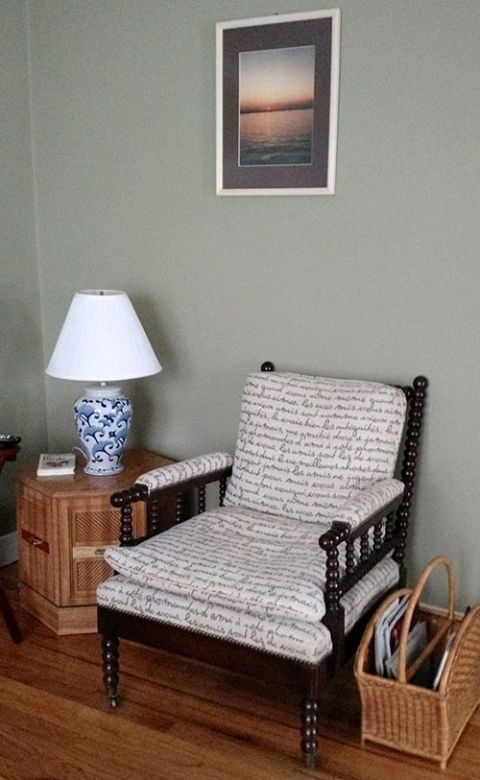
Both Cummings and Cavallo said they called the Bakhita House a home where love heals.
Sometimes, love was as simple as setting expectations. Little by little, the women learned, or relearned, the sense of structure and skills that they had been robbed of during their trafficking experiences — how to iron their clothes, how to write a résumé, and how to manage their time so that they were present every night for dinner and home by their curfew.
They also learned to soften — to forgive, to try to forget, to separate what had happened to them from who they fundamentally were.
Each time a new survivor moved into the Bakhita House, Cummings said that they would gather with the women already living there and sing Shaina Noll's lullaby, "How Could Anyone."
"How could anyone ever tell you / You were anything less than beautiful / How could anyone ever tell you / You were less than whole," the lyric goes.
"It was always very emotional," said Cummings. "Then, when one left, we would sing it with them. That was really powerful."
Deep wounds
Cummings said they strove to meet each woman where she was in the healing process. This sometimes meant addressing wounds that ran deep.
"My father used to hit me," Teixeira said. "I thought, 'Oh, you hit me. That means you love me. You know? 'Cause then you buy me a present later.' "
Raised in this dysfunctional environment, Teixeira said she was unable to recognize her traffickers' abuse for what it was.
Teixeira said her first trafficking experience occurred between 2003 and 2006. What started as an intimate relationship quickly morphed into a dangerous cycle of physical and psychological manipulation. If Teixeira disobeyed, he would beat her, she said. Once, when Teixeira attempted to leave, he threatened to kill her, she said.
8 vigil CROP.jpg
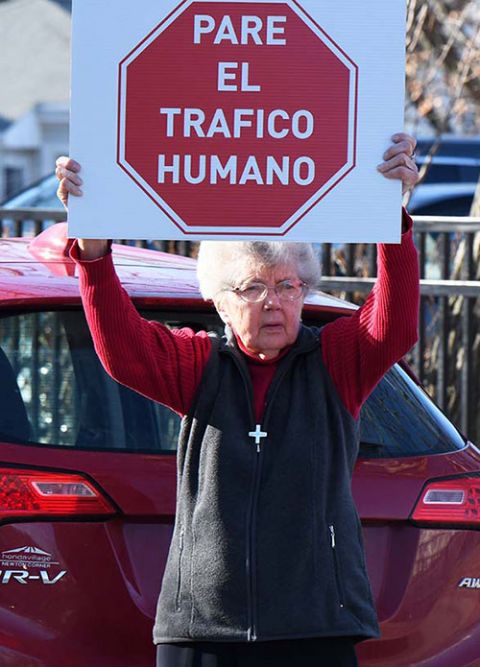
Still, she continued to fight, at last finding freedom when he was arrested and found guilty of false imprisonment and assault.
Only three years later, however, waitressing at a strip club in South Florida, Teixeira found herself being lured into a darkness she thought she'd escaped. The second man who trafficked her presented himself as charming, promising to protect her and showering her with attention.
Then, he started offering her to other men, insisting that it would be ridiculous for her to pass up an opportunity for extra money. Teixeira said he never physically harmed her, but she still felt herself dying inside.
Finally, in 2012, she connected with Lisa Goldblatt Grace, the co-founder and co-director of My Life, My Choice, an organization that supports young victims of sexual exploitation. Through Goldblatt Grace's ongoing encouragement, Teixeira eventually mustered the courage to stand up to her trafficker, proceeding cautiously, playing into his distorted thinking.
"I'm washed up," she said. "You don't even want me. You can find someone else."
At last, he agreed and told her to go. Within three days, Teixeira was back in Boston, living with her mother. Still, Teixeira felt she needed a more stable environment in order to heal. Goldblatt Grace promptly began researching other options.
A month later, in October 2012, Teixeira became the third guest to move into the Bakhita House.
From that moment on, Teixeira said, the sisters treated her like family, filling the fridge with fresh food, helping her apply to classes at Bunker Hill Community College, providing her a quiet study space and, eventually, helping her land a job as a supervisor at the nearby Ocean State Job Lot, where she worked for two years.
4 vigil RESIZE.jpg
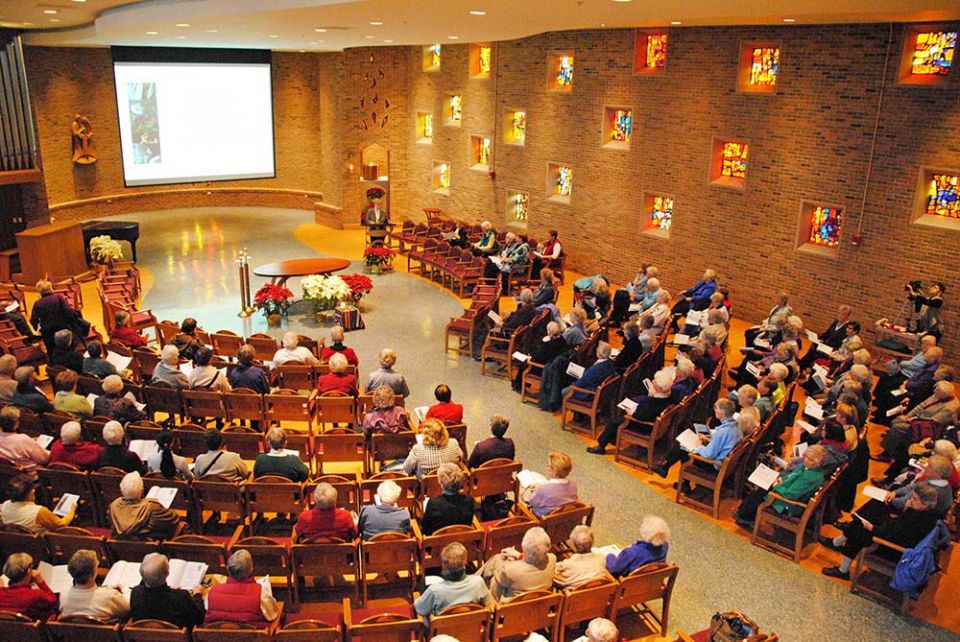
Still, the sisters knew they were not capable of undoing the trauma Teixeira had been through on their own. They promptly connected her, as well as most of the women who lived in the safe house, with the Freedom Clinic at Mass General Hospital, a trauma-informed health care clinic for victims of human trafficking, offering an array of medical and mental health services.
Teixeira, however, said the most memorable part of her experience living in the safe house was the fierce respect she developed for the sisters she lived alongside.
"They just had no fear in them," she said. "I never experienced anything like that in my whole life."
In Teixeira's attempt to move forward, Cummings and Cavallo said they noticed subtle changes in her demeanor.
"I remember her face softening the longer she stayed there," said Cummings. "You know, she was a little tough when she first came, and she softened, and it was just so beautiful."
Sass and skepticism
Others were a slower burn. LaCresha Edgerly, now 38, arrived at the Bakhita House in April 2013. She said she strolled in with a raised eyebrow, unconcerned with hiding the sass and skepticism that was her trademark.
"I didn't know how it was going to go," said Edgerly. "I have a large personality, and I've kind of got an attitude."
'I've never seen people love unconditionally the way they do. Just witnessing and receiving that — it made me feel differently.'
—LaCresha Edgerly
Sold into sex trafficking in Southern Florida when she was 19, Edgerly had spent a decade following other people's orders, letting them do what they wanted — to her body, to her sense of self. By the time she got to the safe house, she said she was determined to reclaim the reins on her life and didn't want to be told what to do — by anybody.
Later, however, the sisters said they had no interest in taking charge or telling anyone what to do with their life. Rather, Cummings said, their experience running the safe house was an exercise in listening — to God, to their intuition and to what the women themselves were saying.
For Edgerly, opportunity came on the day that she strolled by a sign for Empire Beauty School in Malden. That night, at dinner, she mentioned it to the sisters; she had always wondered about being a hairdresser, she said.
"They were like, 'Well, if that's what you want to do, we're going to make sure you do it,' " said Edgerly.
Having once worked as a cosmetologist herself, during her sisterhood, Cavallo supported this goal tooth and nail, helping Edgerly apply to beauty school, get to classes on time, prepare for upcoming exams, and practice styling hair for women in the house.
On the day she graduated, the sisters surprised her with a celebratory cake.
"I didn't feel weird," said Edgerly. "It was like going home to my family."
10 couch RESIZE.jpg
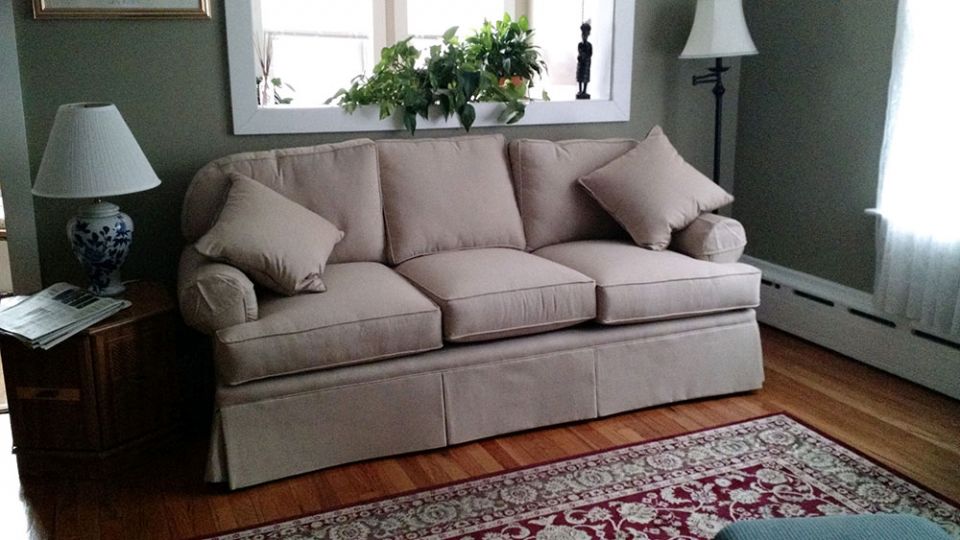
It was also like coming home to herself. Making dinner for the other women in the house, combining unique flavors and working with her hands, Edgerly began to recall her youthful passion for cooking.
After six years working in salons, she is now a professional caterer.
She said she owes a lot of her progress to the sisters who stood by her side.
"I've never seen people love unconditionally the way they do," she said. "Just witnessing and receiving that — it made me feel differently."
Clashes, then laughter
The Bakhita House was a melting pot of women from different generations, cultures and walks of life. Sometimes, their diverse backgrounds and worldviews clashed. Cummings said name-calling and slammed doors were frequent occurrences. It was much like the catty bickering that happens between siblings, she said, because no matter what, at the end of the day, the women found common ground — in their shared struggles or in the primal need for laughter.
"We really did laugh a lot," said Cummings, smiling at the memory. "When you laugh with someone who is very far from your experience, there's something intimate about that."
There were also moments of serendipity.
Jane Clark — a pseudonym, as she asked not to be identified — was a labor trafficking victim forced to keep house and nanny full time in Cambridge for almost no pay. She arrived at the safe house on Easter Sunday 2013. That day, Clark, now 43, had told her traffickers she was going to Easter Mass — church was the only place they let her go alone on the weekends. What they didn't know was that after the service, Peter DiMarzio, victim witness specialist for Homeland Security, picked Clark up and took her to the safe house.
7 vigil CROP.jpg
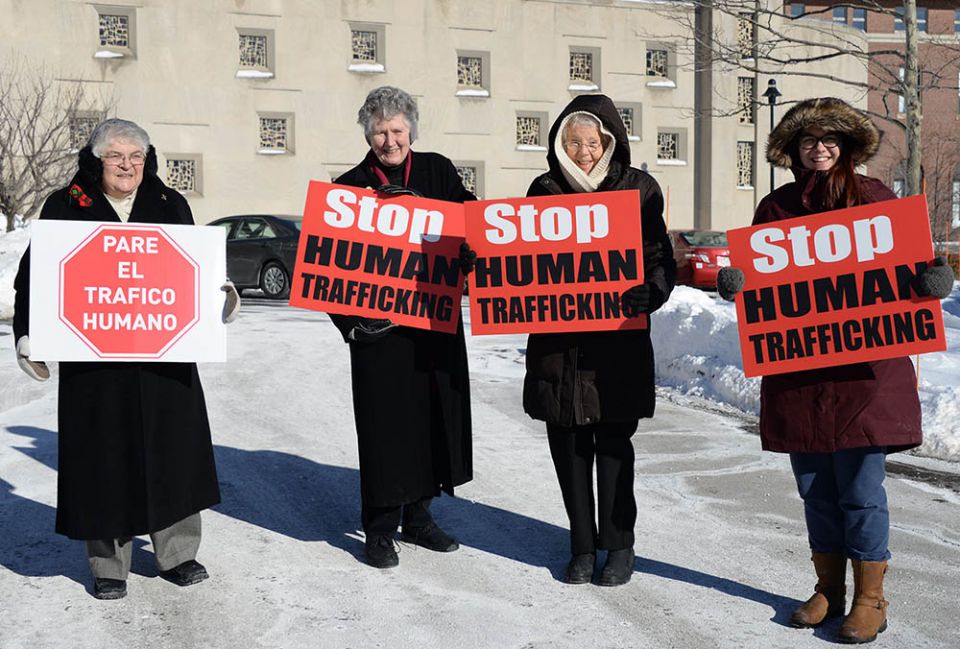
Clark said she would not have connected with DiMarzio if it weren't for the help of a brave friend she met in town, who was from Clark's native country of Zimbabwe.
The Easter that Clark arrived also happened to be Cavallo's 72nd birthday. Later, the two would say that Clark was Cavallo's birthday present. Clark says this with a modest chuckle, but Cavallo says it with sincerity; for her and the other sisters, working with each victim was an opportunity to grow closer to God.
Clark said the sisters' abiding faith gave her strength.
"Sometimes, I'd just be feeling like I need someone to help me pray, and they would always help me," said Clark.
Clark's greatest prayer was answered around Christmastime in 2015, on the day her two sons came home with her from Boston Logan Airport. Today, she lives with them in an apartment outside of Boston. In the summers, she takes them to get ice cream with Cavallo and Cummings.
Taking after their mother, the boys now call Cavallo "Grandma." The nickname is testament to the sisters' enduring ability to make the women feel loved.
Sometimes, this was as simple as noticing and honoring the women's presence — vowing to look them in the eye, every chance they could — from the moment each woman arrived at the doorstep of the Bakhita House to the last meal they shared. Like mothers gazing upon their children, the sisters wanted every woman who entered the safe house to know they were seen, through and through, and, still, they were loved — more deeply than they could ever imagine.
When offered praise on their service, the sisters simply shrug.
"It's all God's work," said Cavallo.
Like what you're reading? Sign up for GSR e-newsletters!


